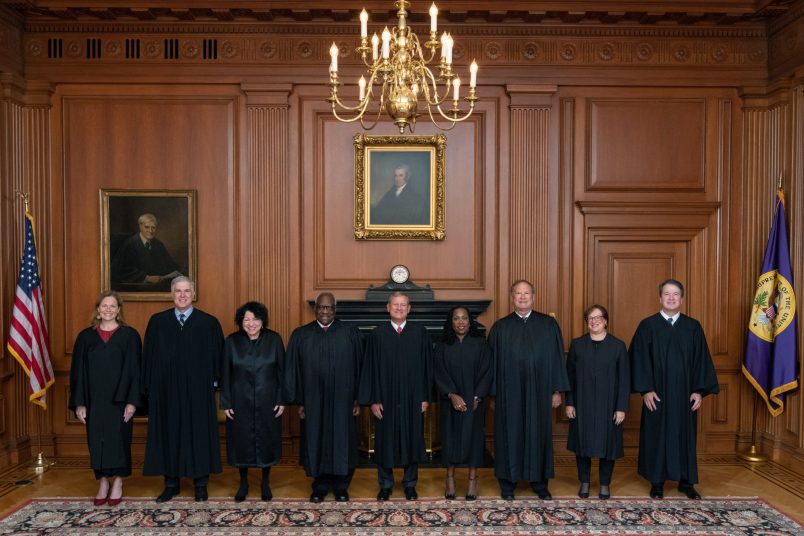To hear them tell it, the Supreme Court justices are very concerned about injecting chaos into an election cycle by upending or approving changes to how voting operates just before people head to the polls.
It’s called the Purcell principle, and it’s been cropping up a lot lately. See Justice Brett Kavanaugh in striking down a lower court order that the Alabama legislature must produce a replacement for its racially gerrymandered congressional maps well over three months before the primaries:
“Late judicial tinkering with election laws can lead to disruption and to unanticipated and unfair consequences for candidates, political parties, and voters, among others,” Kavanaugh wrote. “It is one thing for a State on its own to toy with its election laws close to a State’s elections. But it is quite another thing for a federal court to swoop in and re-do a State’s election laws in the period close to an election.”
Such concern did not seem to influence the justice, or most of his colleagues, in their decision to nullify a lower court ruling from May with direct bearing on the upcoming elections.
The majority on Tuesday voted to moot a ruling from the United States Court of Appeals for the Third Circuit that Pennsylvania absentee ballots missing a date from their outer envelopes must still be counted. Justices Sonia Sotomayor and Ketanji Brown Jackson would not have granted the writ of certiorari, per the order.
The high court’s decision will fling wide the doors to lawsuits in the days before Pennsylvania hosts high-stakes Senate and gubernatorial elections. Based on prior behavior, and the fact that Pennsylvania Democrats voted by mail much more than their Republican counterparts did in the 2020 election, Republicans will likely try to block undated ballots from being counted, while Democrats will fight to have them included.
David Ritter, a Republican who unsuccessfully ran for a spot on the Lehigh County Court of Common Pleas in 2021, requested that the justices nix the ruling. He lost his race by five votes after 257 absentee ballots without dates were counted.
The appeals court reasoned this spring that since any date on the envelopes count, and that only undated ones are tossed out, requiring the date is a technicality that runs afoul of the “materiality provision” of the Civil Rights Act.
Ritter appealed his case to the Supreme Court at the time in an emergency motion, but the majority declined to stop the ballot counting. Justice Samuel Alito dissented, joined by Neil Gorsuch and Clarence Thomas, and urged that a petition for certiorari be filed to let the Court address the “very likely wrong” ruling of the Third Circuit.
There was also a tangential fight over this issue during the Republican primaries when a narrowly trailing David McCormick sued in state court to have undated absentee ballots be counted, the better to catch opponent Mehmet Oz. A judge in that dispute ruled that the ballots should be counted, but much of the drama had already dissipated, as McCormick had conceded by that point.
Oz will now face Democrat John Fetterman in November, one of the marquee races of the cycle that could determine Senate control.
Pennsylvania Attorney General Josh Shapiro (D) is running against state Sen. Doug Mastriano (R) for governor, another banner race not least because Mastriano supports the big lie that the 2020 election was stolen from then-President Donald Trump. In Pennsylvania, the governor appoints the secretary of state.
Read the Supreme Court order here:



